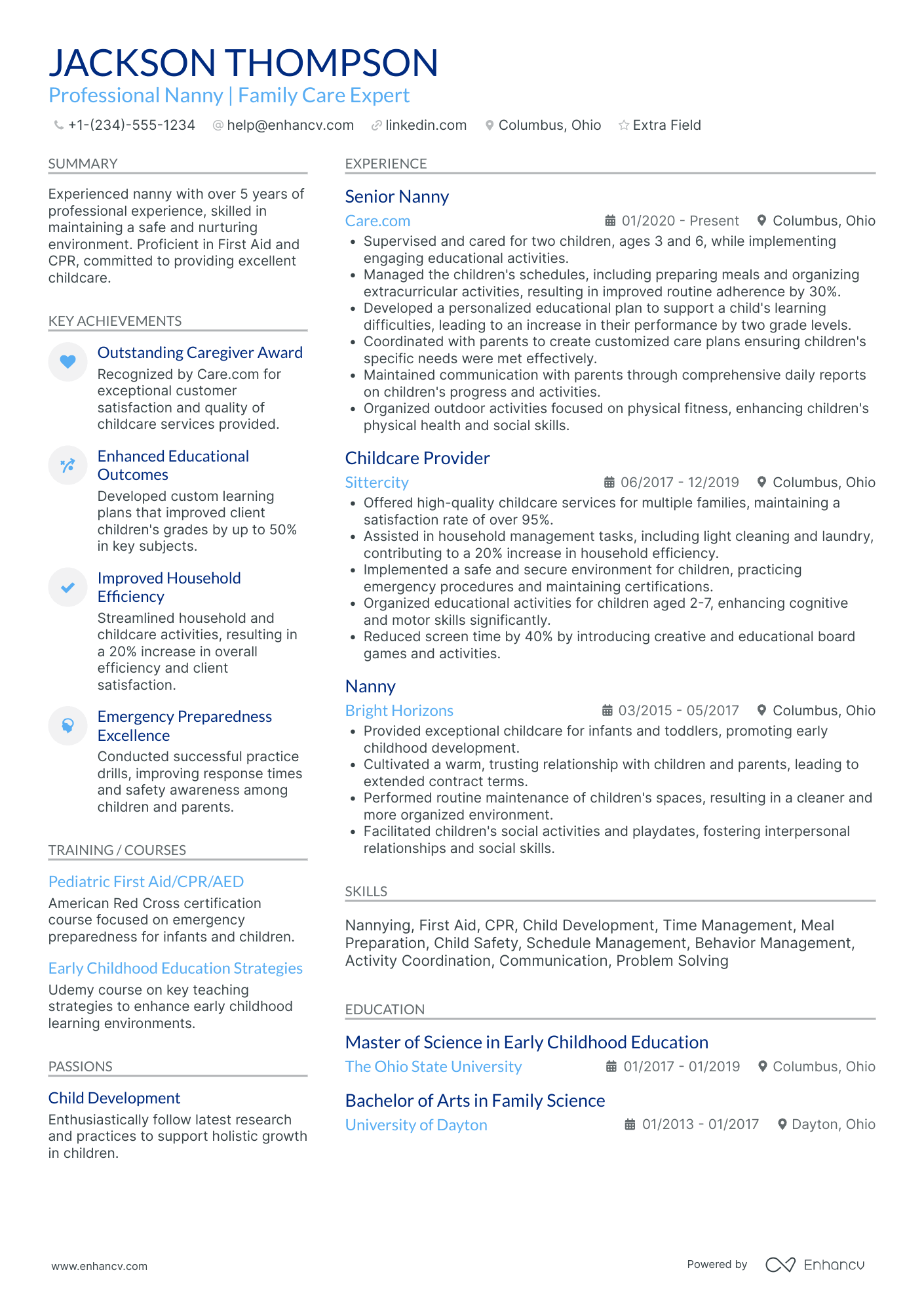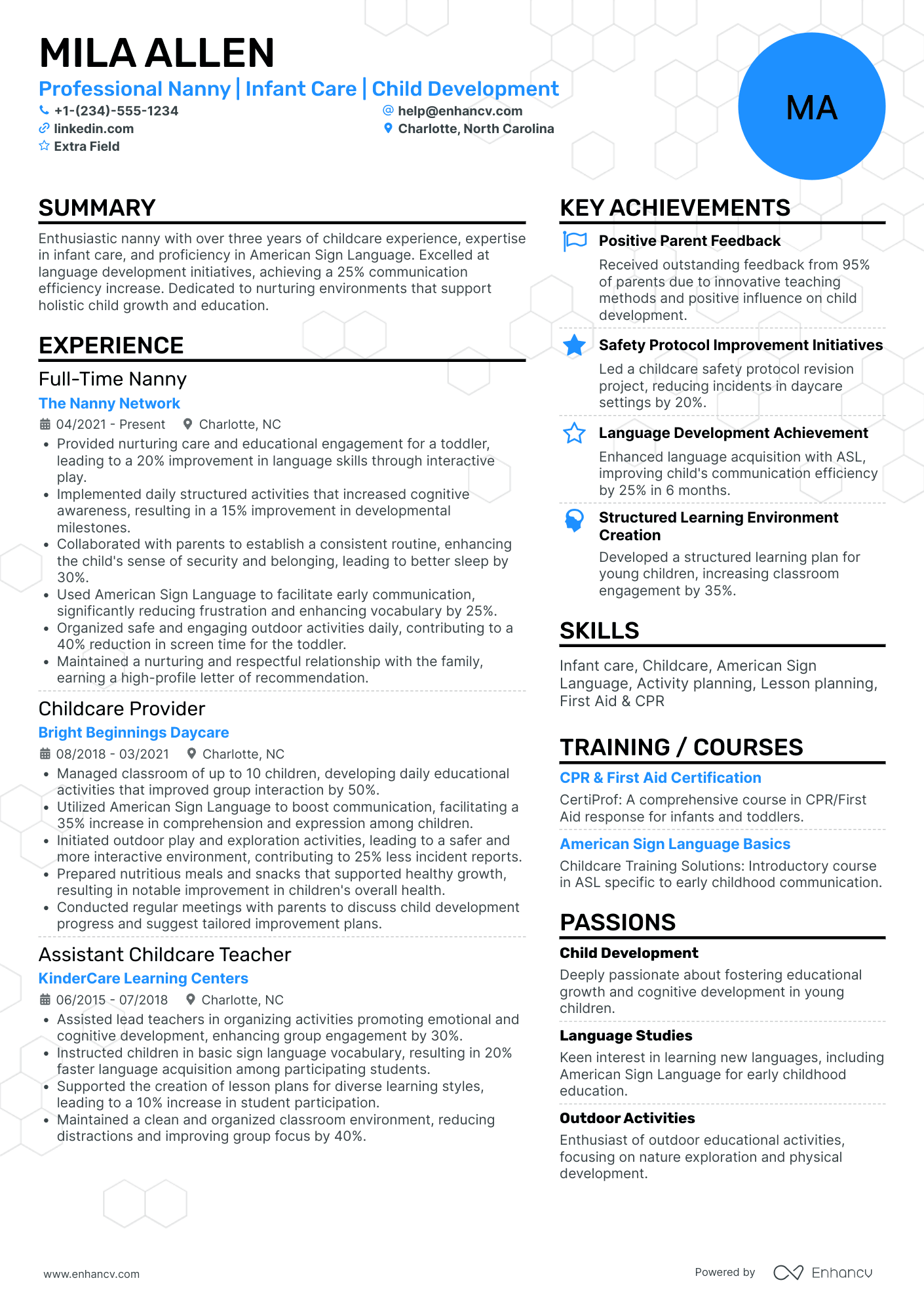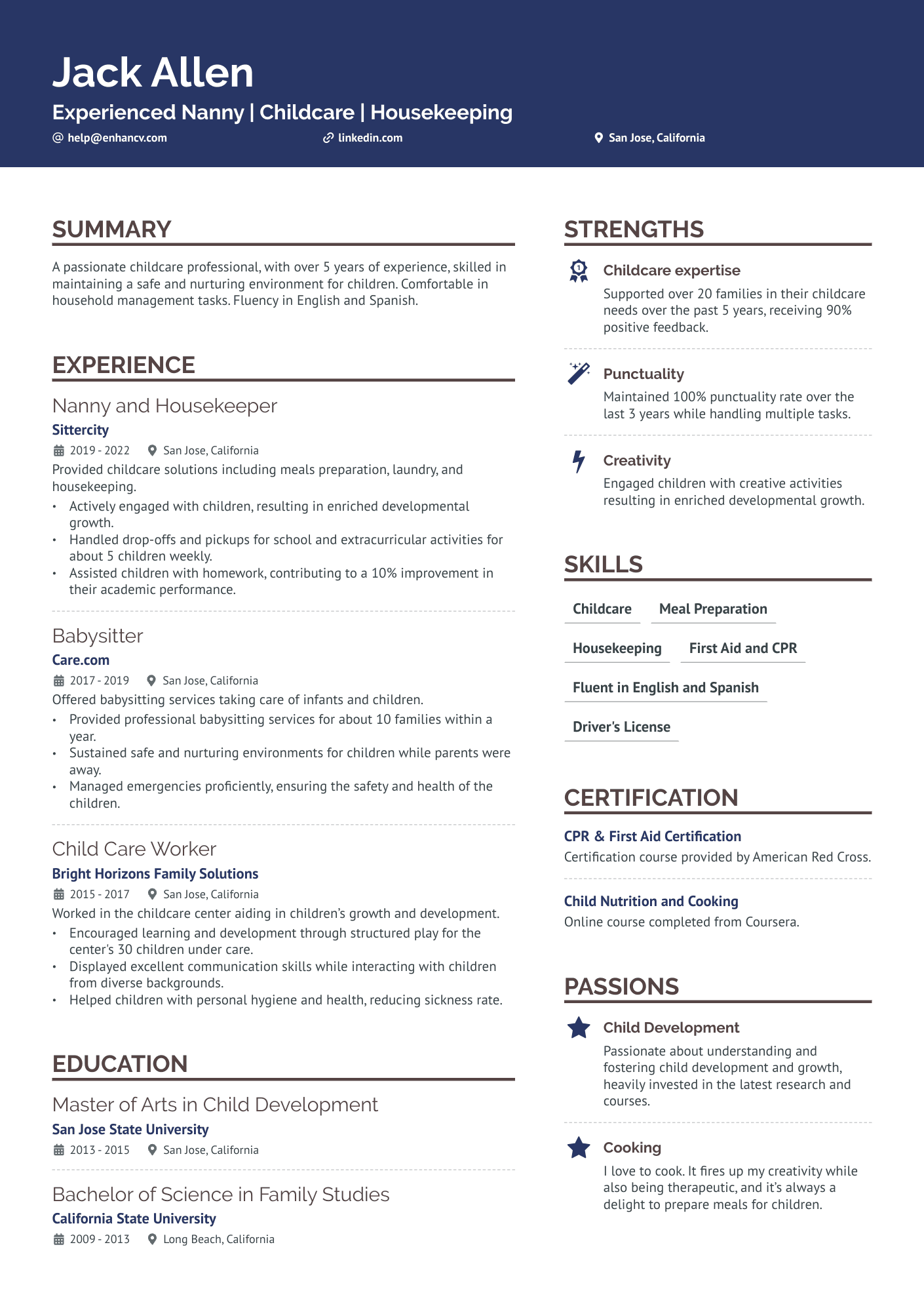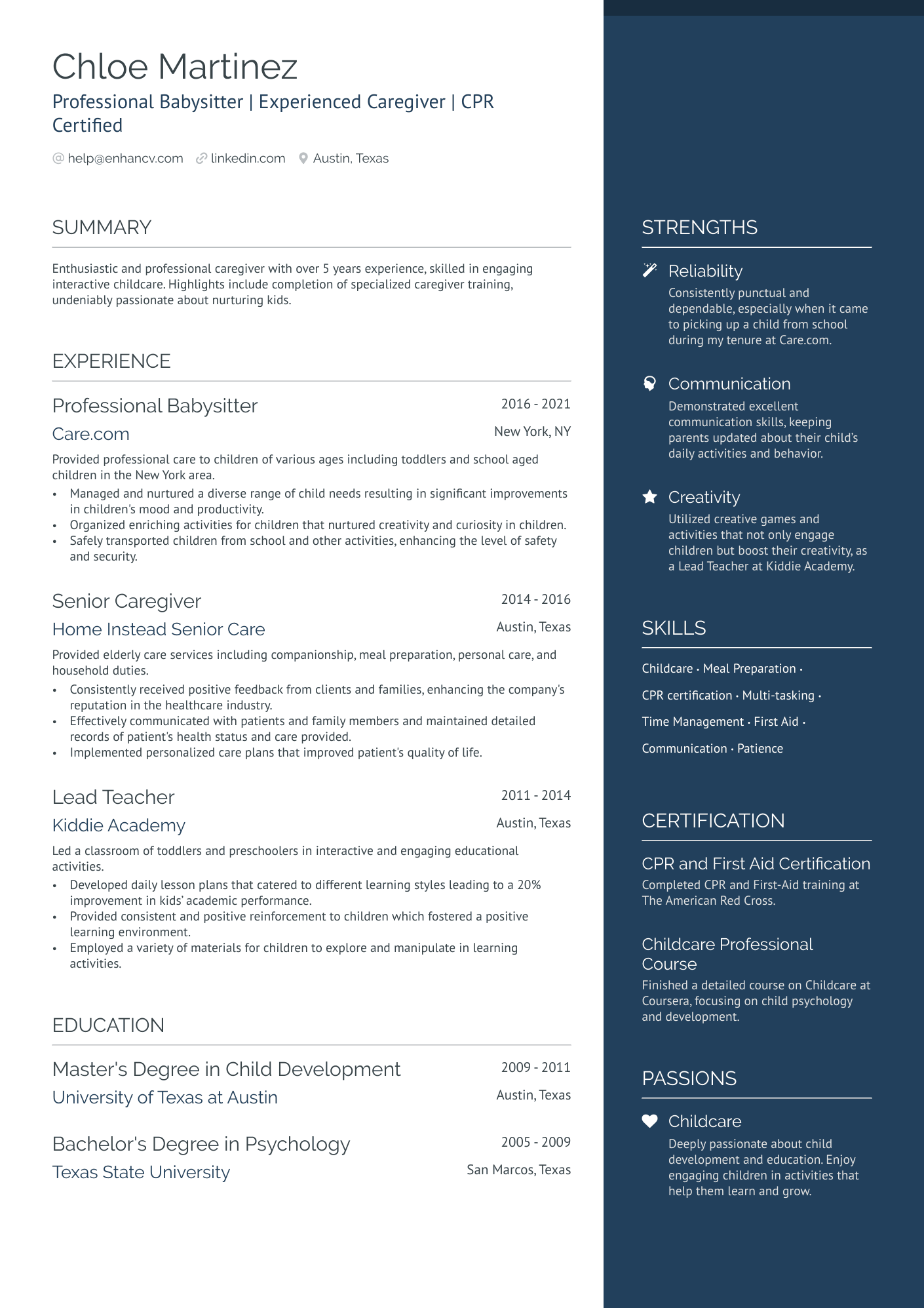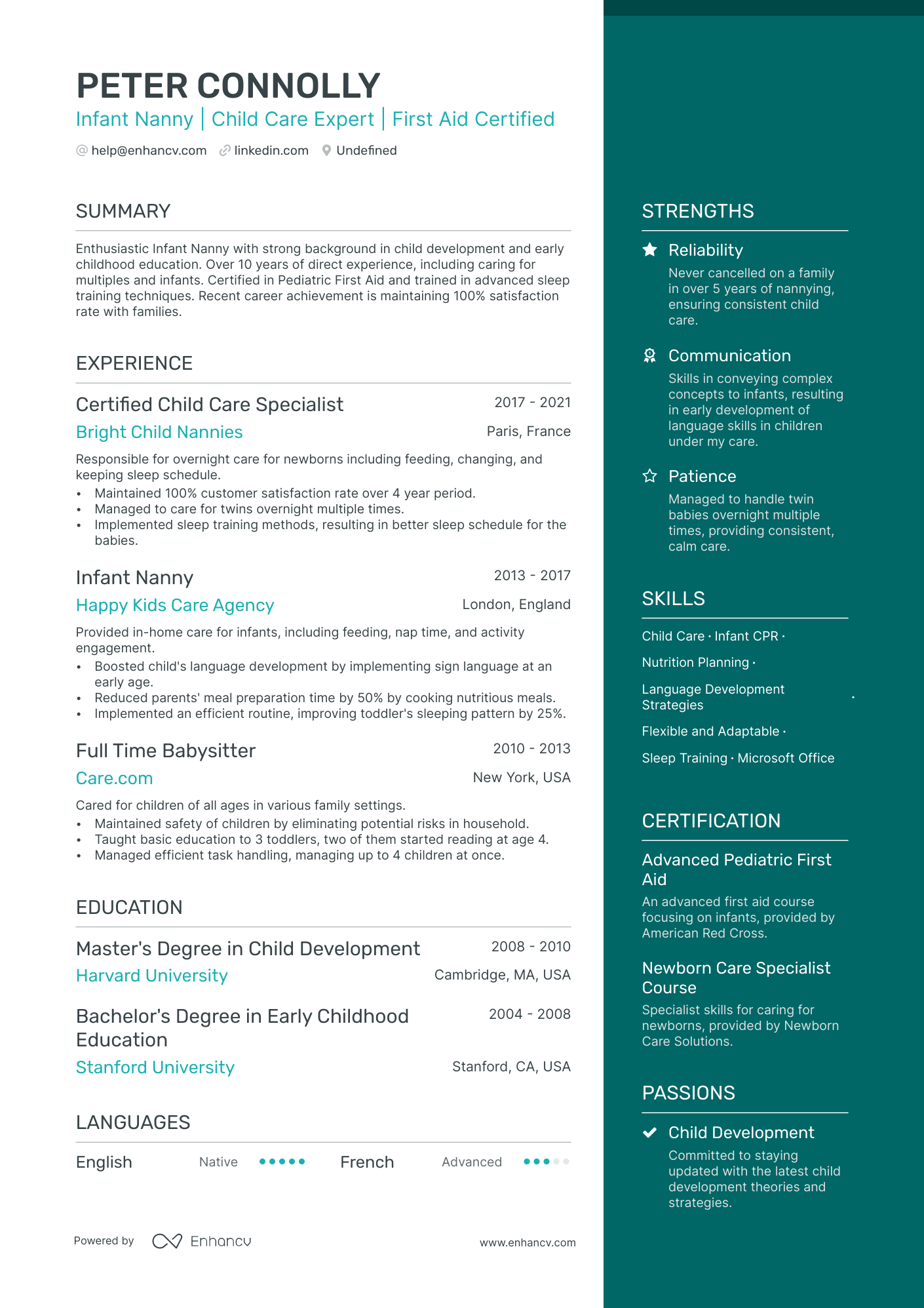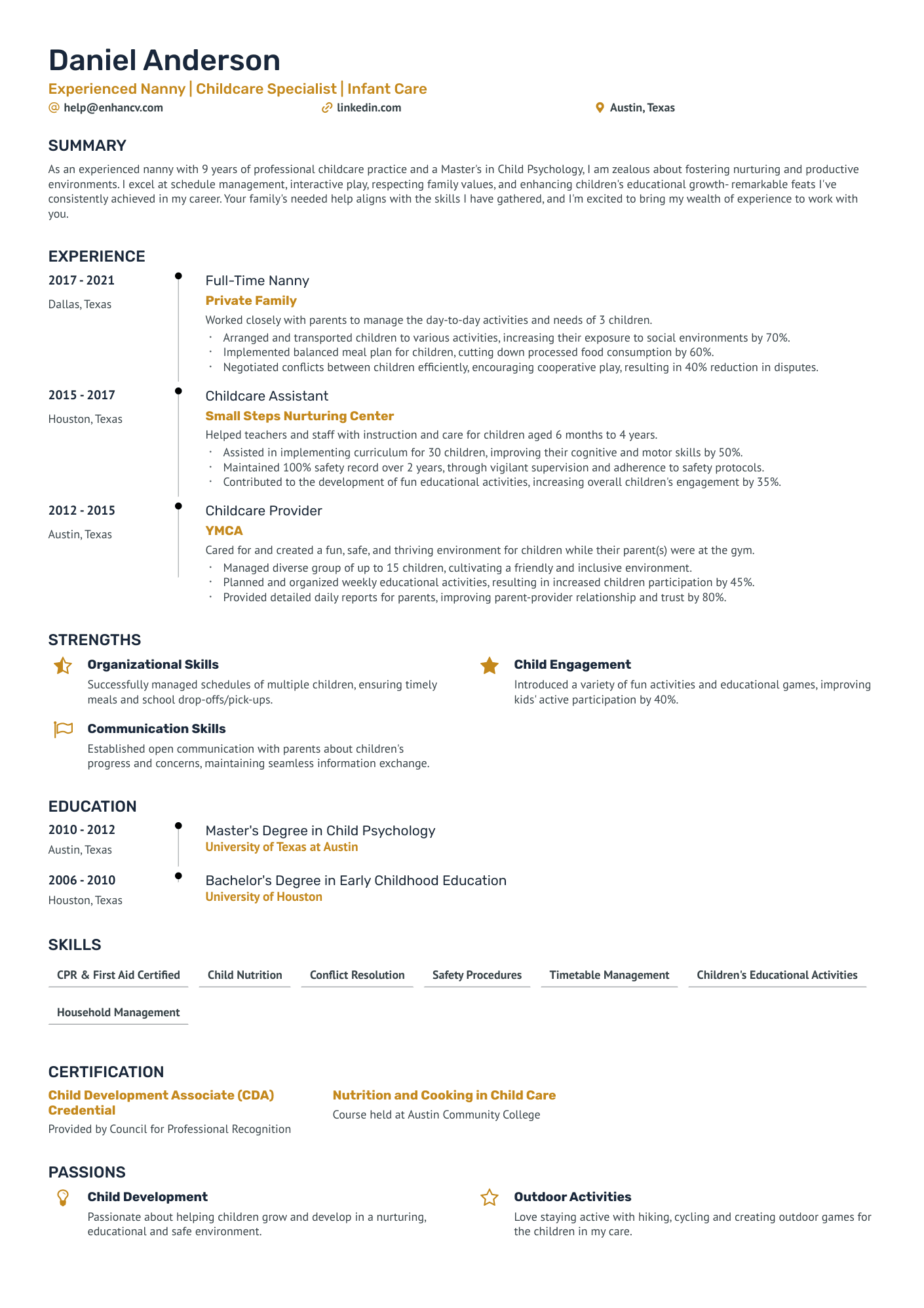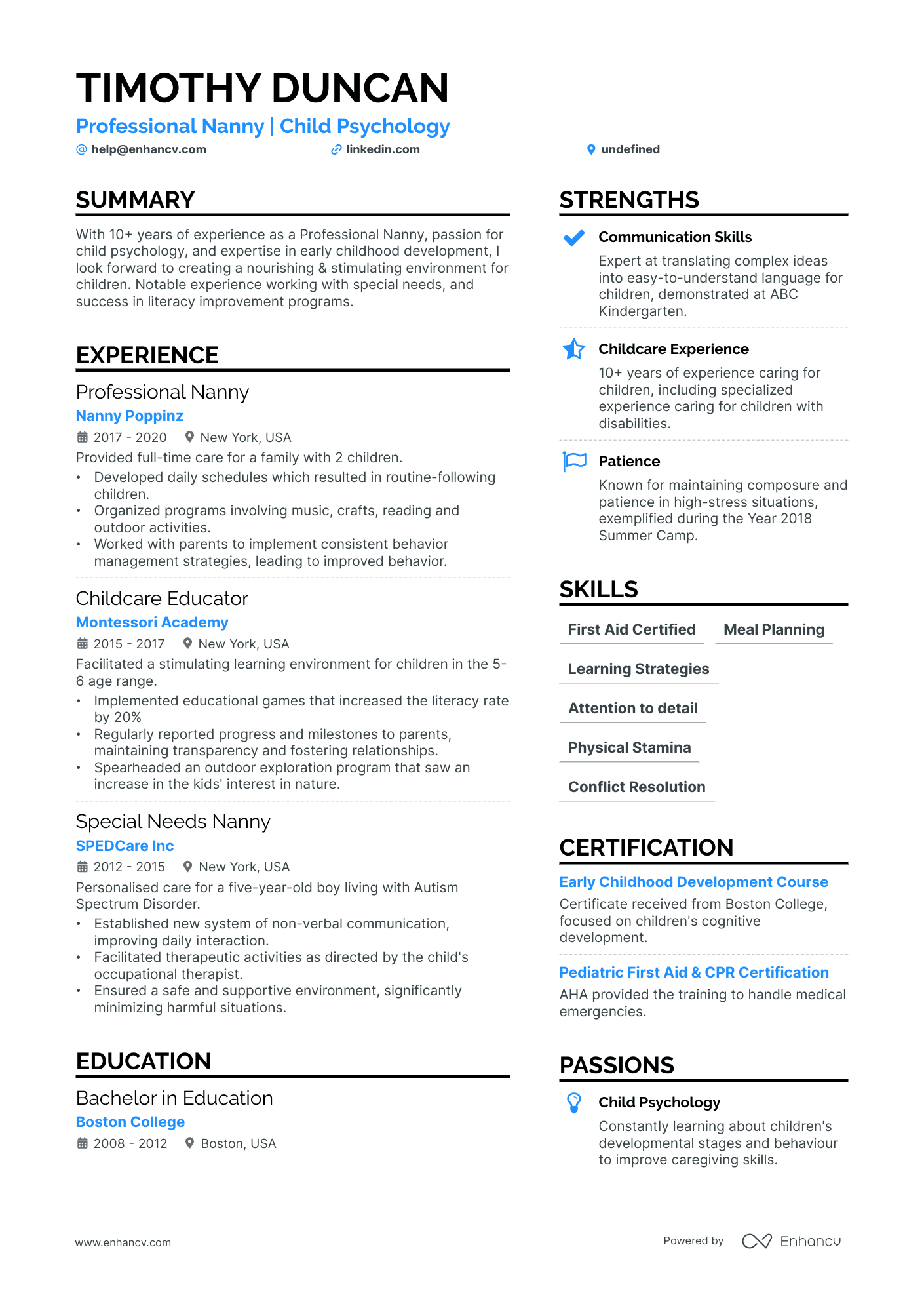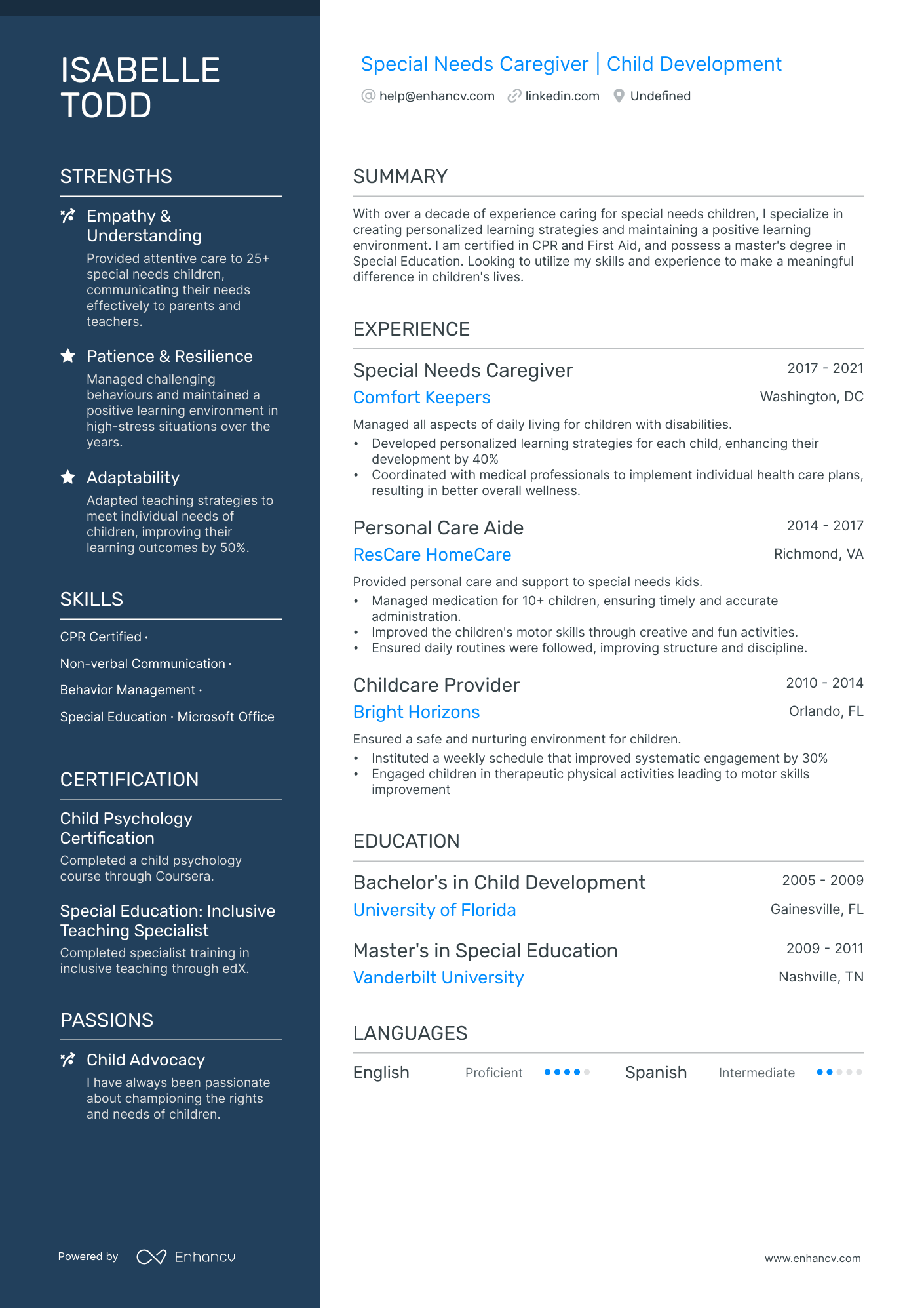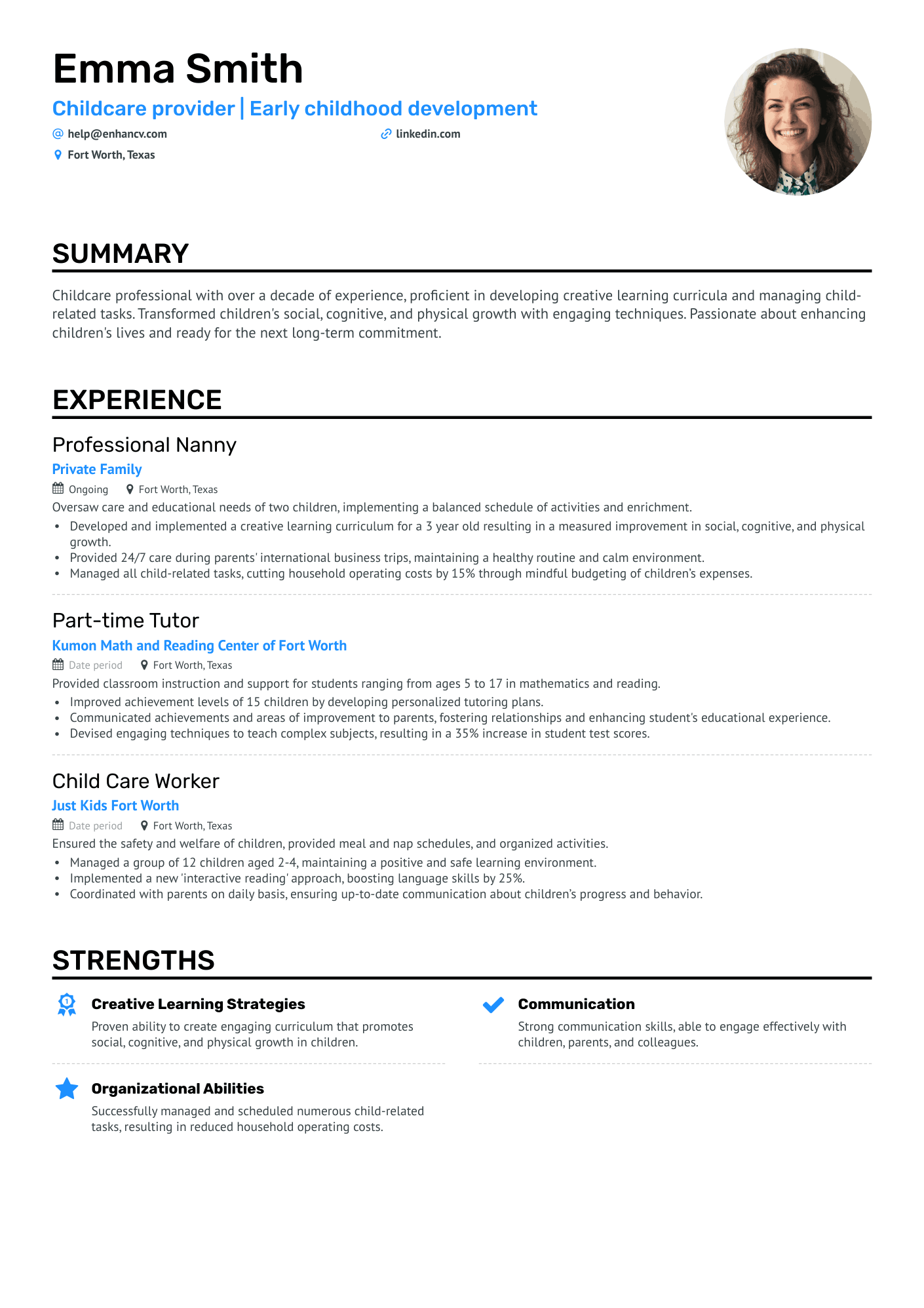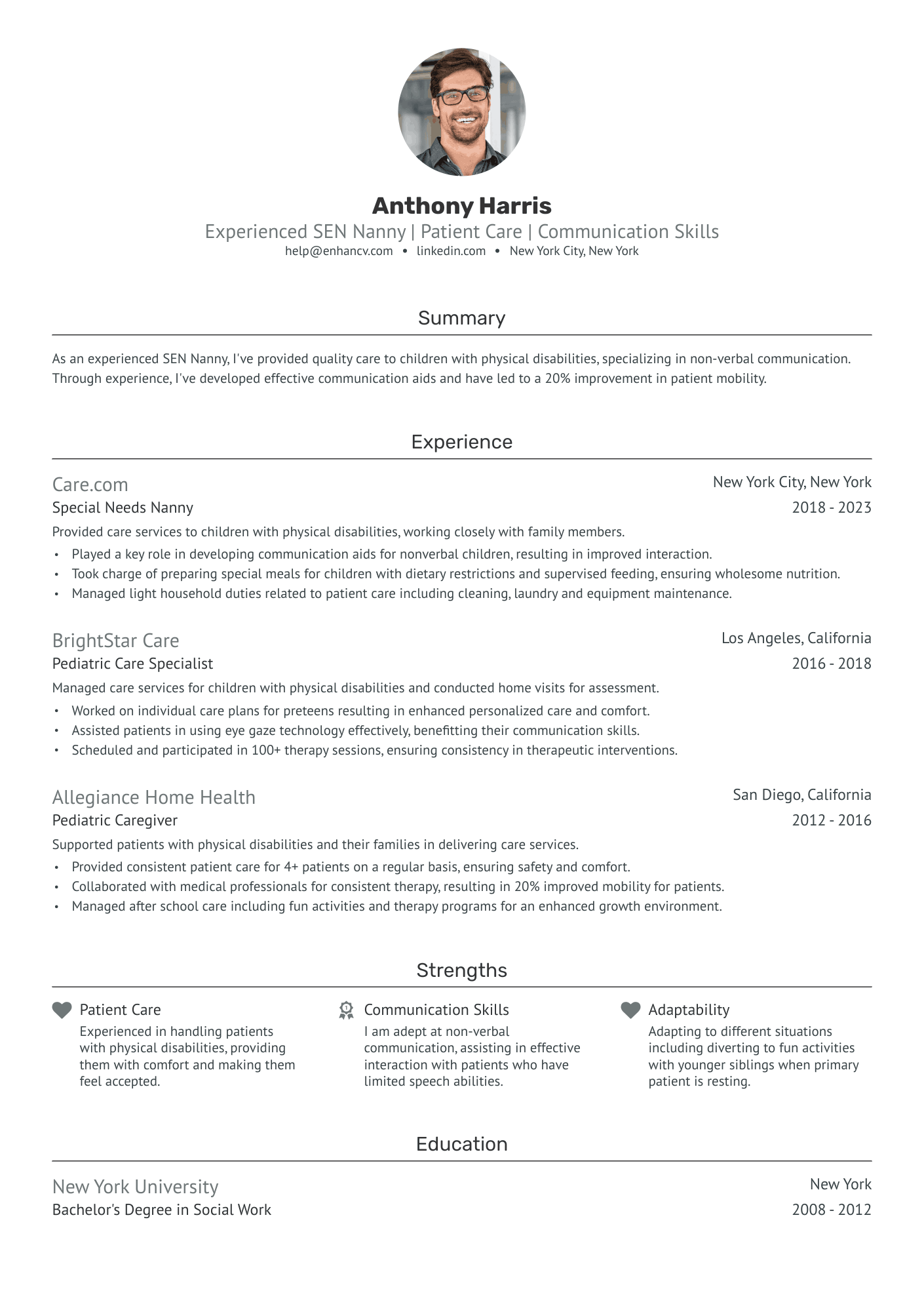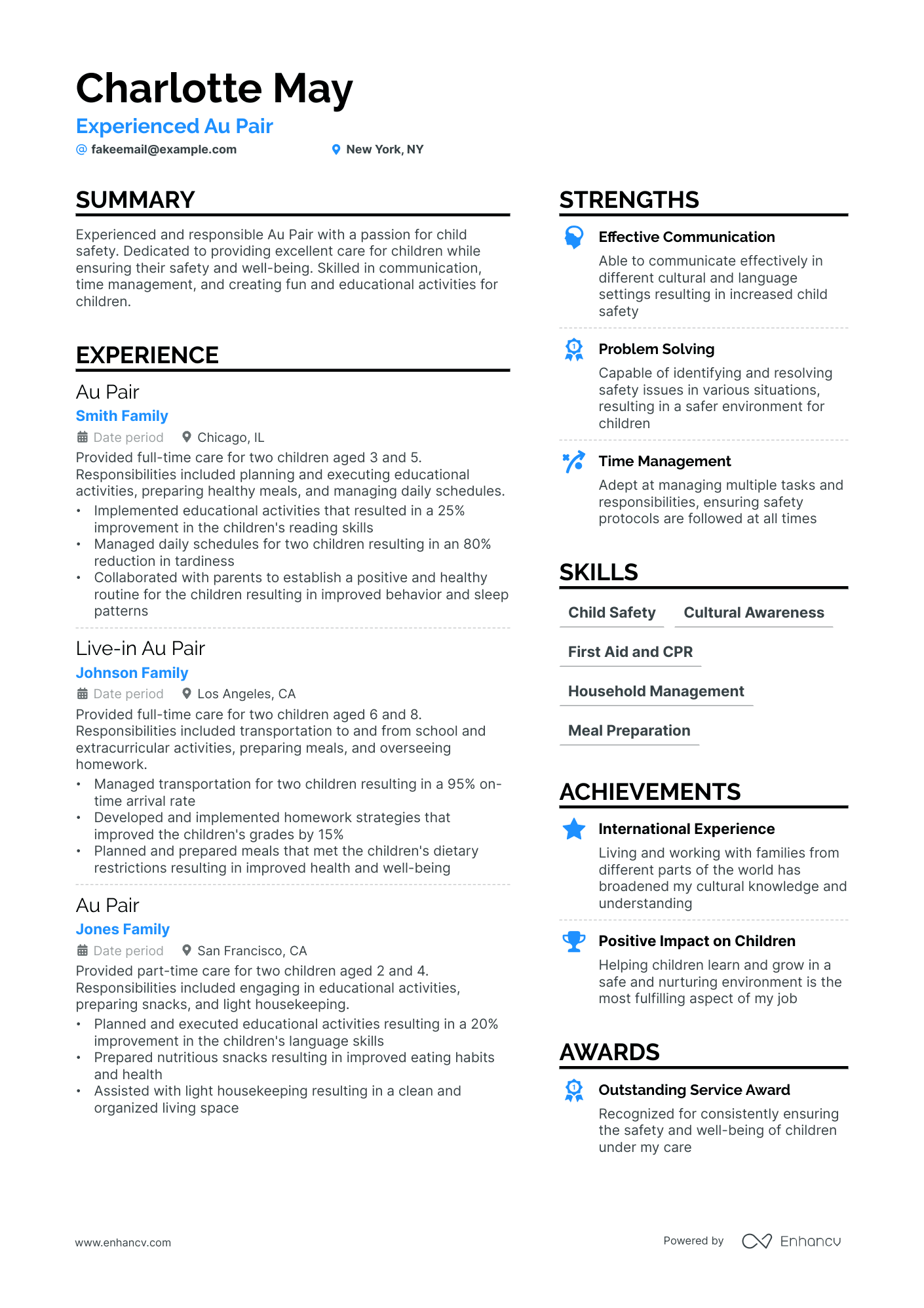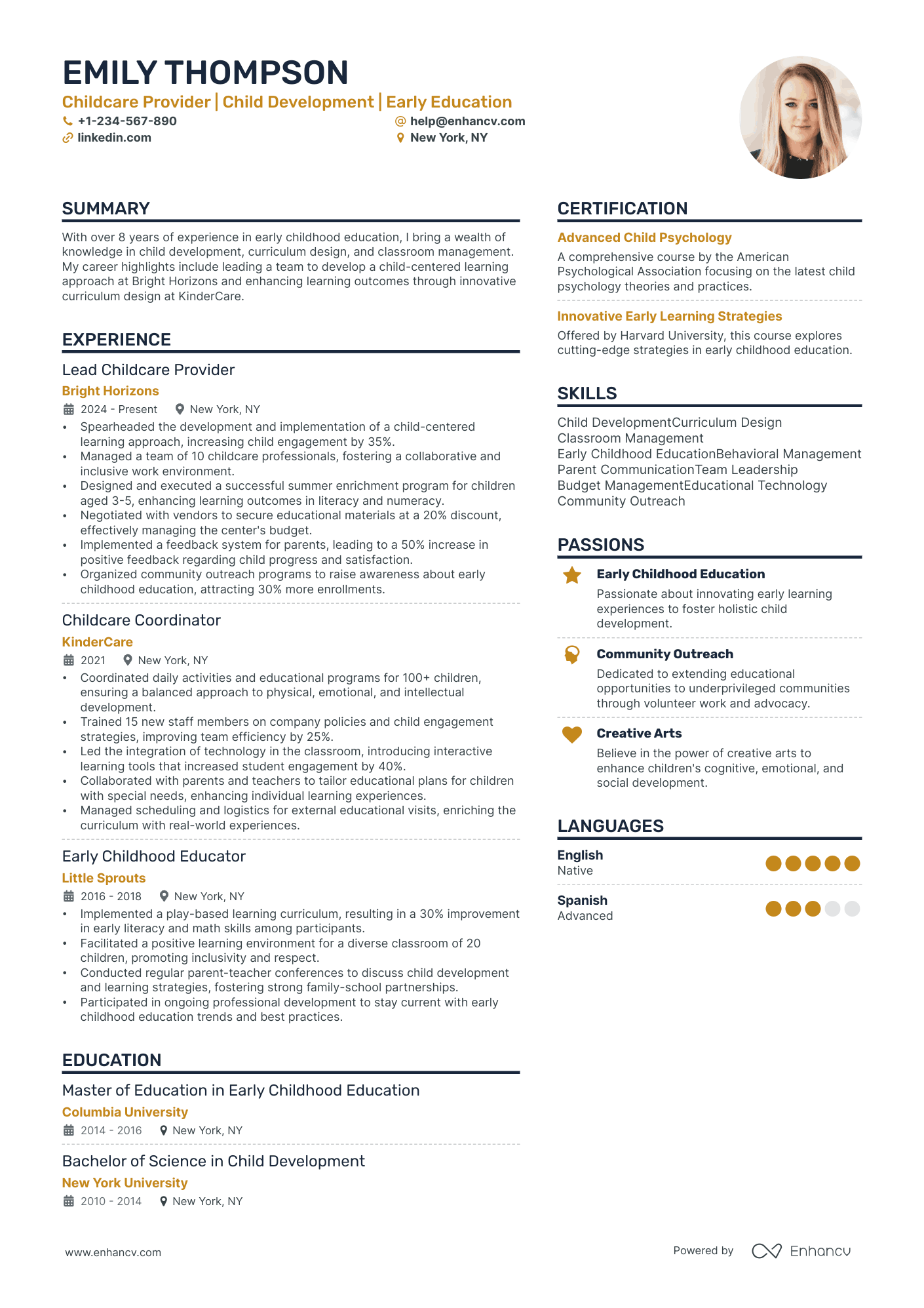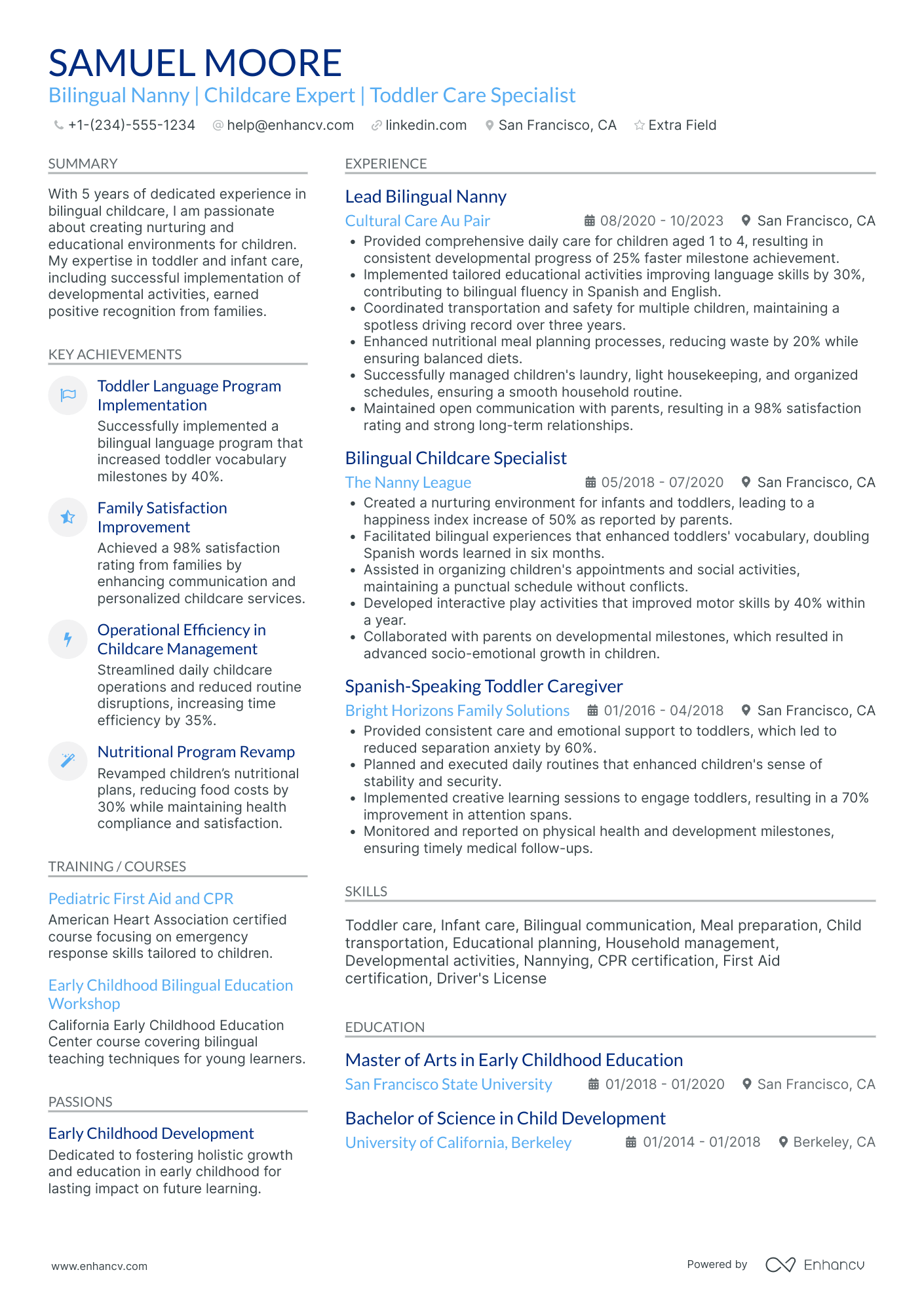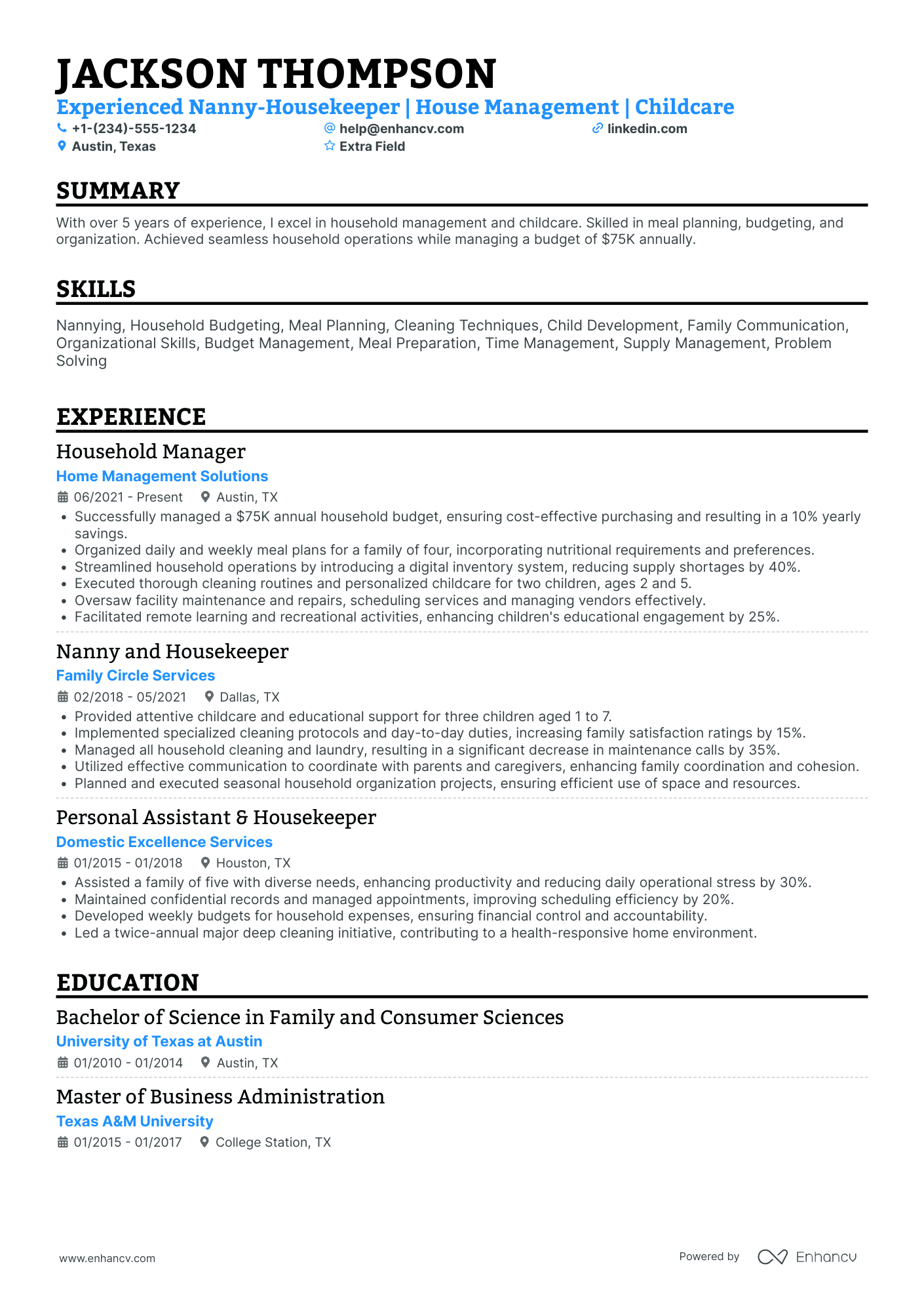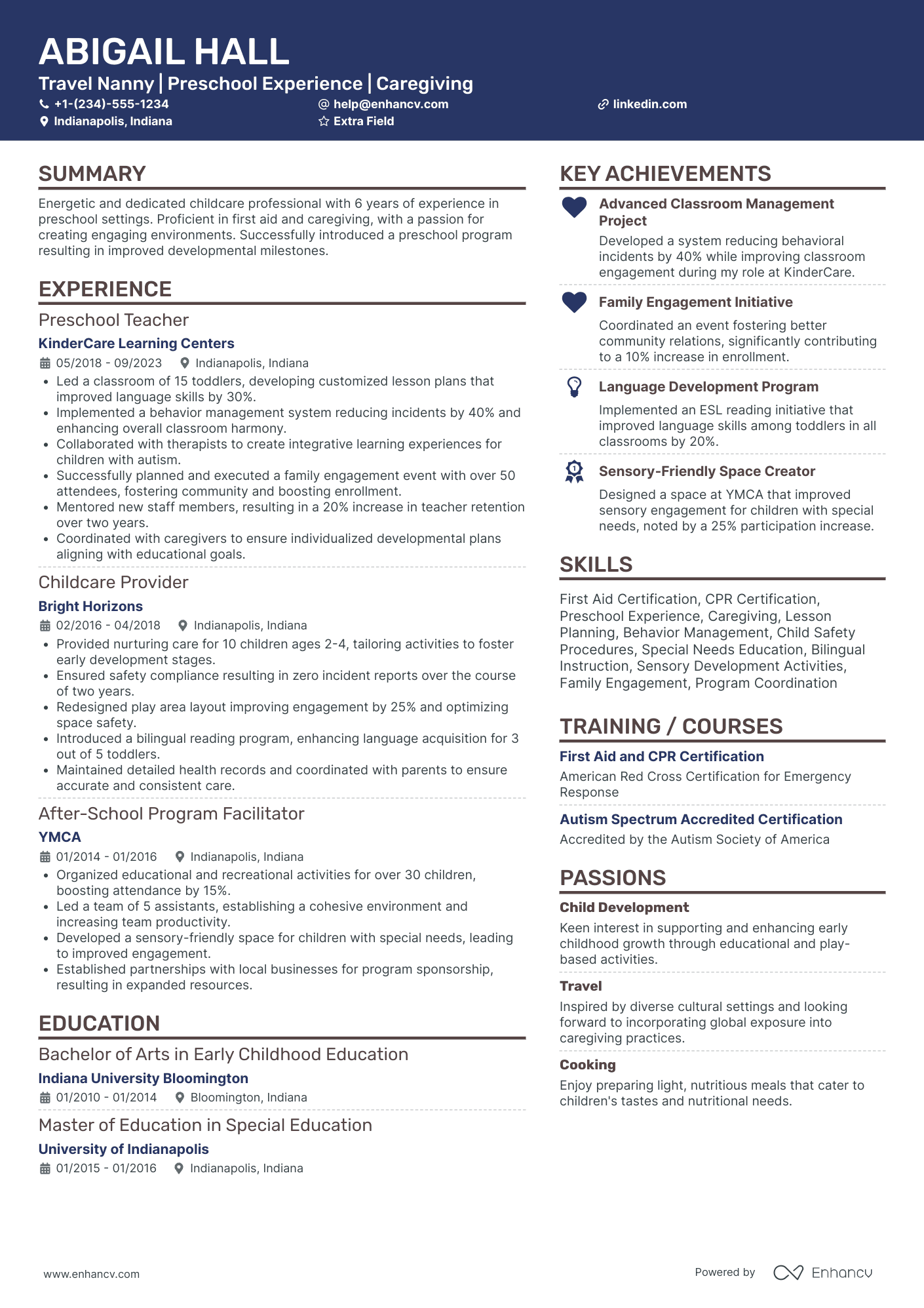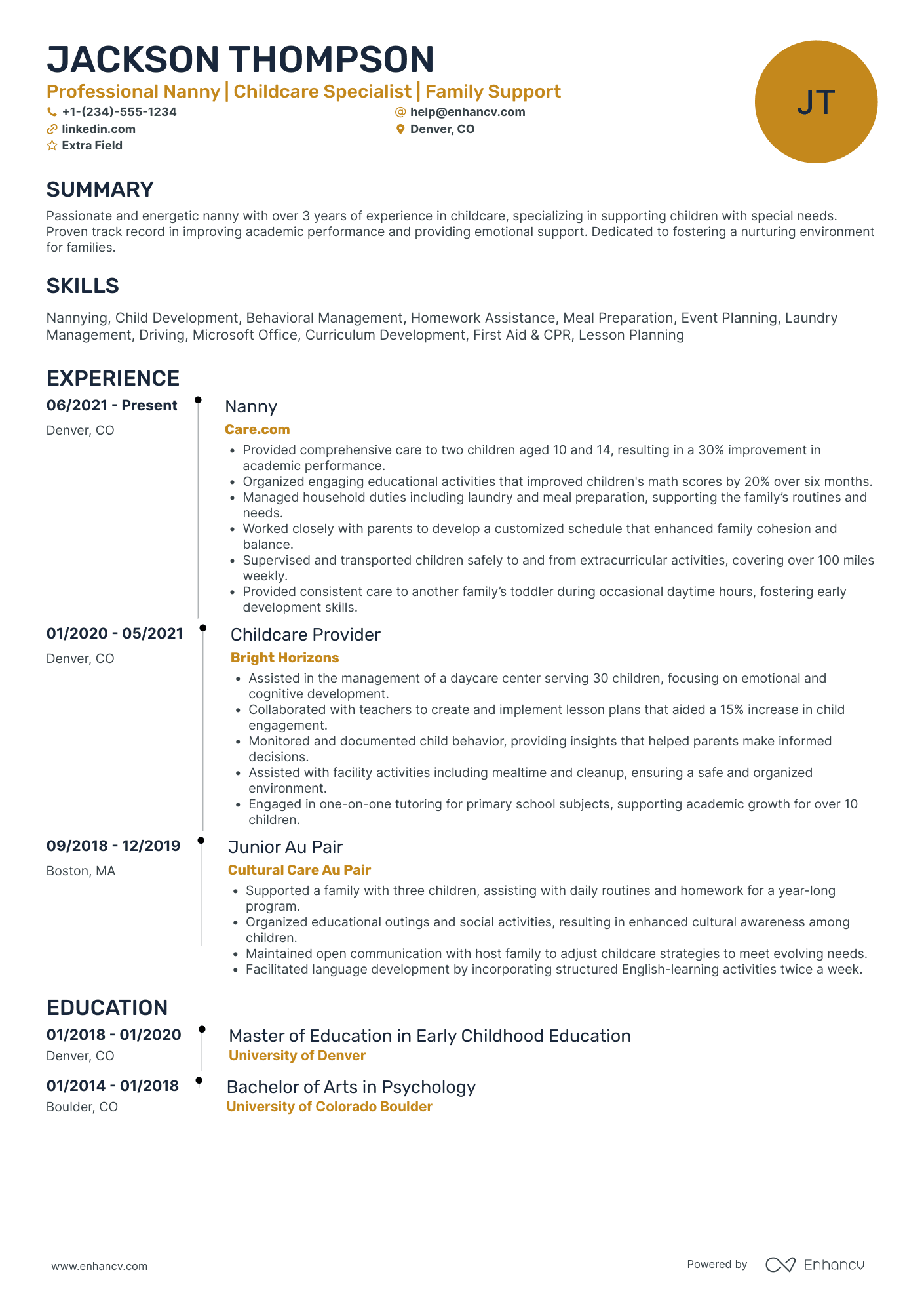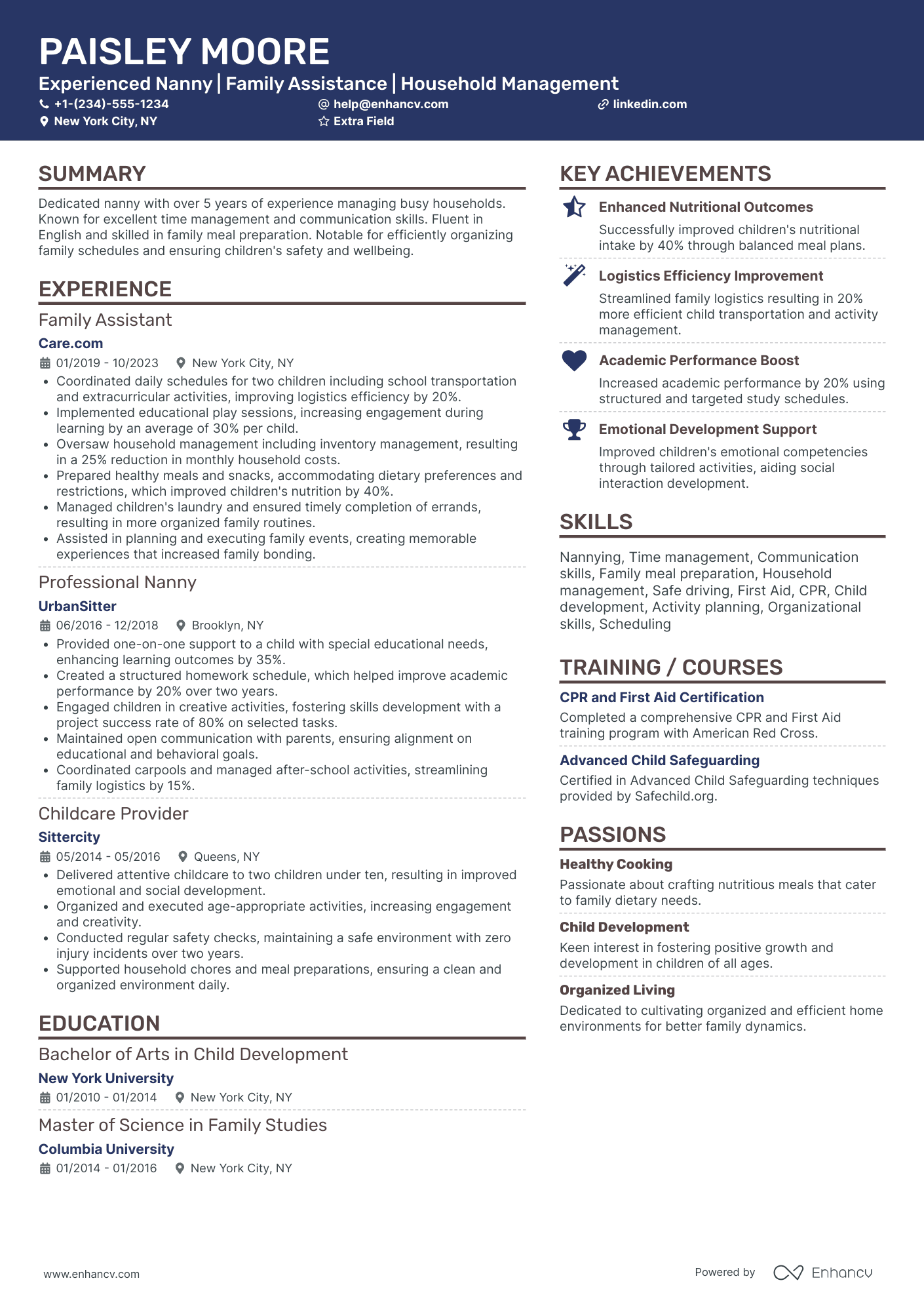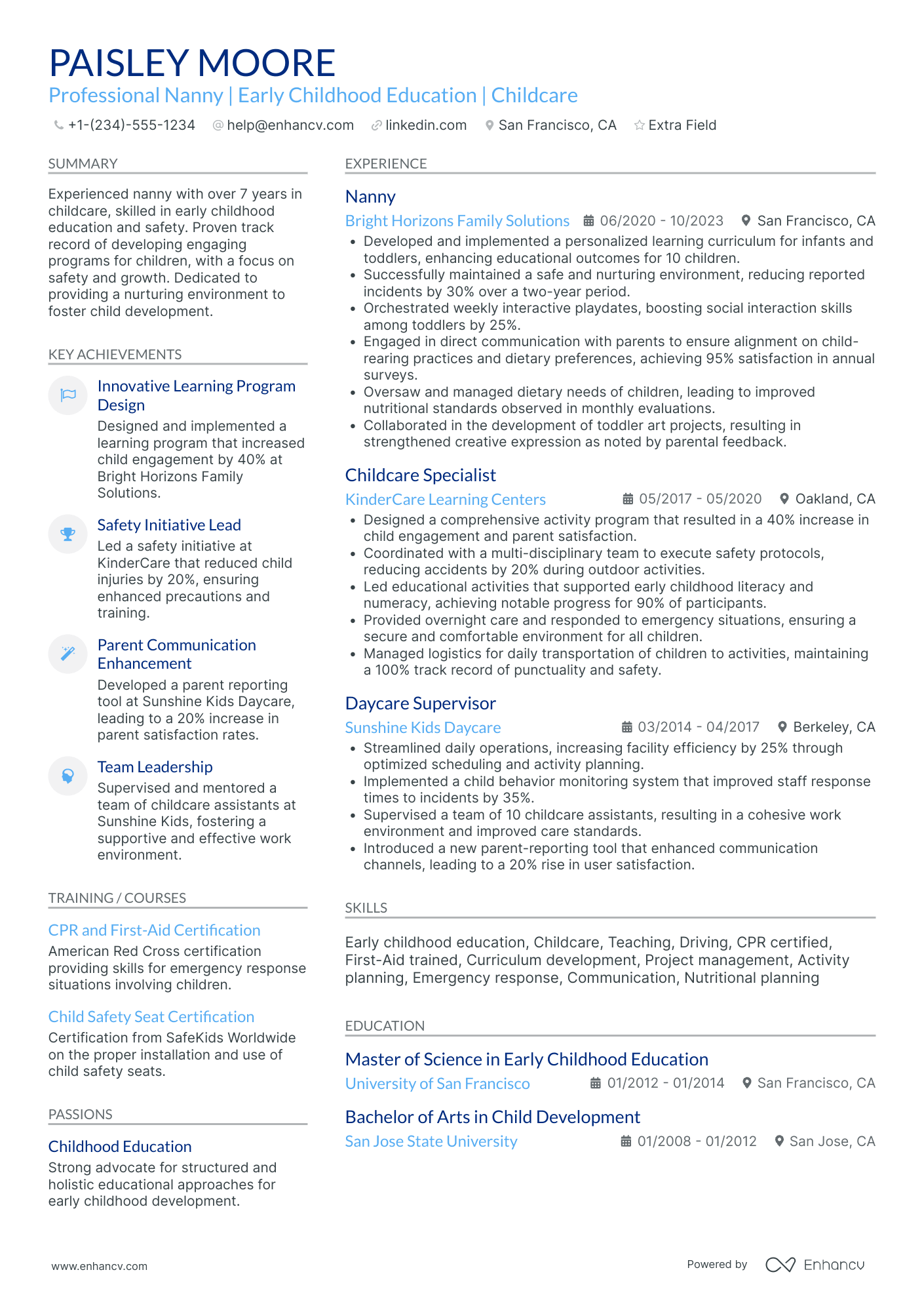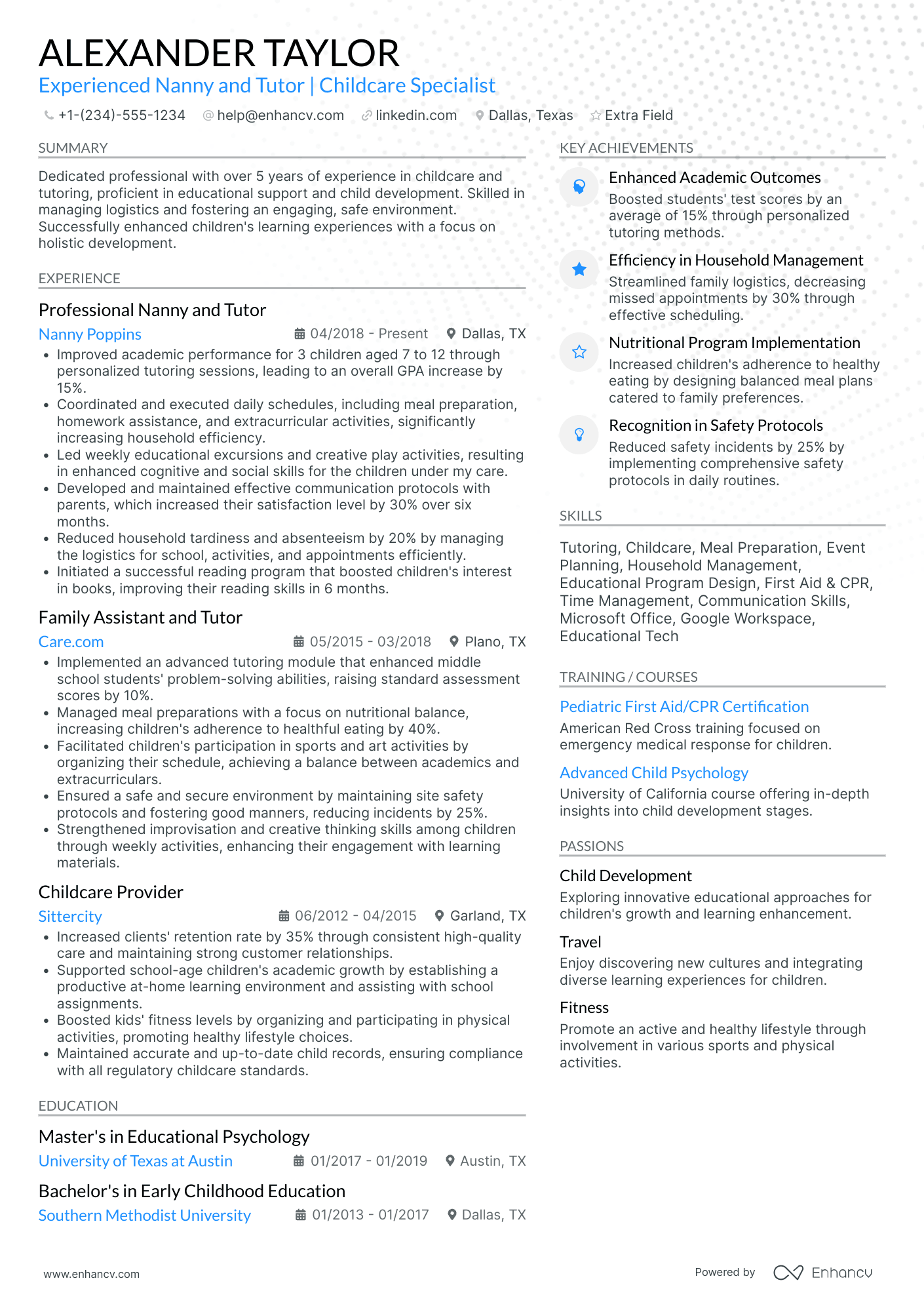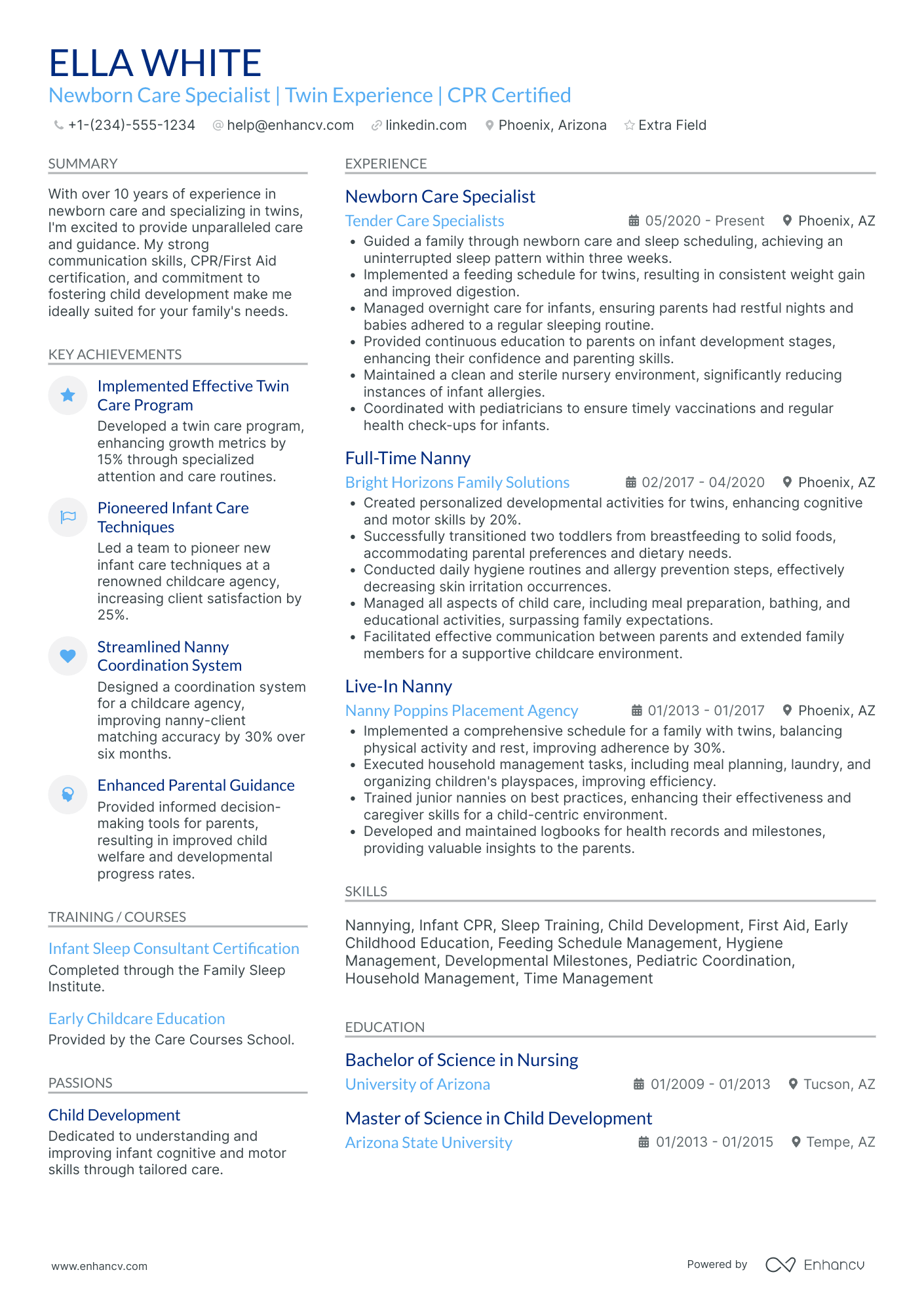Nannies possess a range of valuable soft skills like patience, communication, multitasking, and problem-solving.
These interpersonal abilities are paramount to the role and show dedication to the work.
However, it can be challenging to convincingly and quantitatively communicate these on a nanny's resume.
You want the parent or guardian looking at your resume to know that you’re the right person to welcome into their home and care for their child.
In this guide, you’ll learn:
- How to quantify impact on your nanny resume for a role that relies on soft skills
- How to describe your broad range of experiences in a way that’s easy for potential employers to understand
- How to increase your employability and keep your nanny resume up-to-date with verifiable certifications
- How to highlight achievements to showcase your skillset and commitment to your career
If a nanny resume isn’t exactly what you’re looking for, check out some of our other guides for similar roles:
Nanny resume examples
By Role
How to format a nanny resume
Applying for a nanny position is different from sending your resume off to a hiring manager or recruiter. You want the parents and guardians looking at your nanny resume to know that you’re the right candidate for the job.
The format of your resume needs to communicate a clear and organized message at first glance. Strive for creative and approachable while maintaining professionalism.
Here are a few areas to focus on to create a nanny resume format that gets callbacks:
- Reverse chronological layout - As the name suggests, a reverse chronological layout focuses on work experience in reverse chronological order. Nannies have diverse roles and a wide range of experiences. Show dedication to your career with a reverse chronological timeline.
- Professional header - Include a header at the top of your resume that clearly states your title and professional contact information. Parents may be looking for someone to care for their children as quickly as possible. Don’t miss an opportunity because your contact info wasn’t easy to locate.
- Single page - Guardians of children are busy people without a lot of time to spare. Get straight to the point by keeping every section of your resume short, concise, and relevant to your nanny achievements.
- Clear safety certifications - Some parents or guardians may be looking for nannies specifically with CPR or First Aid Certifications. Show that you’re qualified by displaying your professional certifications clearly and prominently.
Keep in mind market-specific formats – for example, a Canadian resume might follow a different structure.
Is your resume good enough?
Drop your resume here or choose a file. PDF & DOCX only. Max 2MB file size.
The top sections on a nanny resume:
- Personal Information: This is essential as it provides contact details for the recruiter to reach out for interviews or further discussions.
- Career Objective or Summary: Giving a profile summary or an objective helps recruiters understand the aspirations and skills you bring to the nanny position.
- Work Experience: Including previous nanny or childcare-related positions exhibits real-life practice and understanding of the role's responsibilities.
- Skills and Qualifications: Detailing specific skills relevant to childcare (like patience, first aid certifications, or experience with special needs children) can set your resume apart.
- References or Testimonials: Providing parent testimonials or references can verify your skills and experience, giving potential employers confidence in your abilities.
What recruiters want to see on your resume:
- Relevant Experience: Recruiters prioritize applicants with prior experience in childcare or related fields, as it shows their experience in managing tasks associated with a nanny role.
- Certifications: Certifications such as Pediatric First Aid or CPR are prioritized because they are crucial for ensuring child safety.
- Skills like patience and creativity: Nannies require unique skills, such as patience, creativity, and problem-solving, to handle the unpredictable nature of child behavior.
- Flexible Schedules: Applicants with flexible availability, particularly those able to manage early morning, late night, or overnight care, are often prioritized to accommodate a family's dynamic schedule.
- Exceptional interpersonal skills: Recruiters prioritize those who demonstrate excellent communication skills in their interaction with both children and adults, to ensure clear and effective communication with parents and children alike.
How to write your nanny resume experience
The experience section of your resume lists your work history along with 3-4 bullets highlighting your top accomplishments in the role.
A nanny's role is incredibly diverse, and it can be a challenge to encapsulate all the potential duties, from child care, tutoring, and housekeeping tasks to meal preps, in a resume without making it too long or difficult to understand.
You want to capture your top abilities while highlighting specific achievements.
Let’s look at an example of a nanny resume experience section.
- •Supervised children and babies
- •Provided homework help after school
- •Built relationships with families
What doesn’t work in this example:
- No measurable results - Providing quantifiable metrics can be difficult for nannies, but it’s important to show potential employers how you will achieve goals. Be specific in the outcomes you achieved in previous roles.
- No soft skills - Being a nanny requires strong competency in soft skills like empathy, communication, and problem-solving. This experience section would be stronger with more examples of soft skills.
- Not tailored to the target job - Parents and guardians have varying needs for their children. Make sure that your nanny's resume demonstrates how you will meet their specific expectations by tailoring your resume to your target job.
Let’s make a few changes and take another look.
- •Supervised 12 children ages 2-8, provided emotional and behavioral support for children with special needs
- •Led homework help after school, improved school grades an average of 30%
- •Built relationships with families and maintained a 95% satisfaction rating from client surveys
What works in this example:
- Real numbers and data - Including measurable data like “improved school grades an average of 30%” and “Supervised 12 children ages 2-8” shows potential employers what you’re capable of without leaving anything up to assumption.
- Tailored to target job - Read the job listing closely and add relevant experiences like “Led homework help” and “provided emotional and behavioral support for children with special needs” so parents and guardians will see that you have their specific goals in mind.
- Specific achievements - “Built relationships with families and maintained a 95% satisfaction rating” shows potential employers the success you’re capable of and how you achieved it.
How to quantify impact on your resume
With nanny positions relying on communication and intangible skills, it can be difficult to show quantifiable results.
It’s important to include real numbers and data where possible so potential employers can see specific examples of success.
Here are a few areas to consider when quantifying the impact on your nanny resume:
- Include the number of years of experience in childcare: This reveals the extent of your professional nanny experience to recruiters.
- Specify the number of children you have cared for before: This clarifies the scale of your previous responsibilities.
- Indicate the ages of kids you've worked with: This shows your versatility in dealing with different age groups.
- Mention if you were a live-in or live-out nanny and for how long: This gives a sense of your adaptability and commitment.
- Highlight any accomplishments, like reducing screen time by a certain percentage: Tangible successes in previous roles can convey your proactive approach.
- Include the length of longest tenure with a family: This demonstrates your reliability and commitment to a role.
- Share the number of meals and/or snacks prepared per day: This shows your practical household skills.
- If applicable, list the number of languages spoken: This presents an added benefit for families requiring language learning assistance for their children.
How do I write a nanny resume with no experience
Getting your first nanny job can be intimidating if you have no experience. Whether you’re just starting out or making a career change, you need to show potential employers that you have the right skills for the role.
The best way to do this is to focus on transferable skills instead of work history. Show parents and guardians how you’ve developed nanny skills through other means.
Follow these steps to writing an effective nanny resume with no experience:
- Choose a functional resume layout
- Focus on transferable skills
- Use additional sections to highlight skill development and specialty knowledge
- Tailor every section to fit your target job
A functional resume layout focuses on transferable skills rather than your experience section.
This is a great method to show potential employers other ways that you’ve learned relevant skills like child care and safety precautions.
Don’t pad your experience section with irrelevant jobs just to fill space. Only include roles that equipped you with transferable skills for a nanny position.
Other jobs in a caregiver role like working at a daycare or assisted living facility are a great way to show relevant skills. Roles in education or housekeeping are also an opportunity to show skills like early childhood education and multitasking.
How to list your hard skills and soft skills on your resume
Being a nanny requires unique skills that can be difficult to present on a resume. Organizing your nanny skills into two sections will help to communicate your abilities.
Hard skills are the technical knowledge and abilities needed to perform job duties, whereas soft skills are the interpersonal and communication skills needed to interact with others.
Listing hard skills is fairly straightforward as they don’t typically require an explanation.
Here is an example of hard skills on a nanny's resume.
Families seeking a nanny will have varying expectations. For example, some might be looking for a nanny who can provide homework support while others need someone to help with household chores.
Be sure to only include skills that are relevant to your target job.
Here are a few more hard skills to consider for your nanny resume.
Best hard skills for your nanny resume
- First Aid Certification
- CPR Certification
- Child Psychology Knowledge
- Special Needs Care
- Swimming Supervision
- Language Proficiency (e.g., Spanish, French)
- Music and Art Proficiency
- Meal Preparation
- Newborn Care
- Early Childhood Education
- Driving Skills
- Educational Software use
- Knowledge of Children's Games
- Conflict Resolution
- Cooking and Baking skills
- Cleaning and Laundry skills
- Basic IT Skills
- Advanced Reading Comprehension
- Knowledge of Age-appropriate Learning Activities
- Home Safety Knowledge
Soft skills can be interpreted in different ways, especially for a dynamic position like a nanny. Provide an example of your top soft skills so families will see how you used those skills in previous roles.
Here is an example of a soft skills section on a nanny's resume.
Read the job listing closely and determine what soft skills your potential employers value the most.
Here are a few more nanny soft skills to consider for your resume.
Best soft skills for your nanny resume
- Patience
- Empathy
- Active Listening
- Dependability
- Multitasking
- Adaptability
- Creativity
- Time Management
- Attention to Detail
- Physical Stamina
- Problem-Solving
- Stress Management
- Decision Making
- Compassionate
- Enthusiasm
- Responsible
- Observant
- Cultural Awareness
- Respectfulness
- Professionalism
How to list your certifications and education on your resume
There are no specific degree requirements to be a nanny. However, certain qualifications can increase your employability and value in the industry.
Families and caregiver agencies often want to see that nannies have received certifications in health and safety procedures.
Receiving a degree in childhood education or a similar area can also boost your nanny resume.
Let’s look at the education section of a nanny resume example.
Your education section should include:
- Name of institution
- Name of degree
- Years attended
Your certification section will also be short and concise. Families and agencies want to know quickly whether or not you’re certified. Save them time by displaying your certifications clearly and prominently.
Your nanny certification section only needs to include the name of the certificate and the issuing institution.
Here is an example of a certification section on a nanny's resume.
Certain safety certifications have an expiration date and must be renewed periodically. Be sure to keep your certifications up-to-date and only list valid certificates on your nanny resume.
Here are a few more certifications to consider for your nanny resume.
Best certifications for your nanny resume
How to write your nanny resume summary or objective
A summary or objective is an opportunity to introduce yourself and your value in the industry to potential employers. It captures your career history and top accomplishments in 3-4 sentences.
Though the terms are often used interchangeably, there is a slight difference between a summary and an objective.
A summary is a brief introduction that summarizes your career and top achievements. An objective looks to the future and captures what you are hoping to achieve in your new position.
A summary is more suitable for candidates with experience in the field. Entry-level candidates are more likely to focus on an objective.
If you have at least some nanny experience, combine them by writing an introduction, a career highlight, and a goal you share with your target employer.
Let’s take a look at an example of a nanny resume summary.
What doesn’t work in this summary:
- Generic statements - “Professional nanny with a passion for childcare” doesn’t provide any specifics on what makes this candidate qualified for this specific role.
- Unclear credentials - “Trained in educational strategies” is a vague explanation. If you have specialized knowledge, let parents and guardians know that you have unique qualifications.
- Not tailored for the target job - “Seeking opportunity for my next nanny position” gives the impression that this is a blanket resume. Show your target employers that you’ve read the job description and have specific goals in mind.
Let’s make a few changes to this summary and take another look.
What works in this summary:
- Target niche - “Professional nanny with 9 years of experience caring for elementary-aged children” shows potential employers that this candidate has experience with a specific age group.
- Specialized qualifications - Including expertise in “early education and literacy invention strategies” communicates that this candidate is a good fit for employers looking for a nanny to support their child in their education.
- Specific goal - This candidate lists a clear objective at the end of the summary that shows they aren’t just mass emailing their blanket resume to nanny agencies.
Optimize your resume summary and objective for ATS
Drop your resume here or choose a file.
PDF & DOCX only. Max 2MB file size.
Additional sections for a nanny resume
Additional sections on your resume can be a great way to show how you’ve developed nanny skills in ways that don’t fit the standard resume sections.
Here are a few sections to consider adding to your nanny resume:
- Languages - Speaking multiple languages can be a great skill for nannies, especially if the family you are applying to work for is bilingual or wants their children to learn another language.
- Continuing Education - Continuing to expand your education and increasing your industry knowledge is a great way to increase your employability as a nanny.
- Volunteer Work- Volunteering is a great way to learn interpersonal skills and show how you have developed transferable skills like problem-solving and empathy.
Key takeaways
You’re just about ready to send off that amazing nanny resume that gets interviews! Before you start reaching out to families and agencies, let’s review a few key points.
- Choose a format for your nanny resume that sends a clear message and presents your qualifications in concise sections.
- Present a good balance of soft skills and hard skills to show you have the specialized knowledge required to do the job.
- Tailor your nanny resume to your target job so parents and guardians know that you have the specific experience and credentials they’re looking for.
- Include additional sections on your nanny resume that show how you’ve developed relevant skills in ways outside of your work history.
